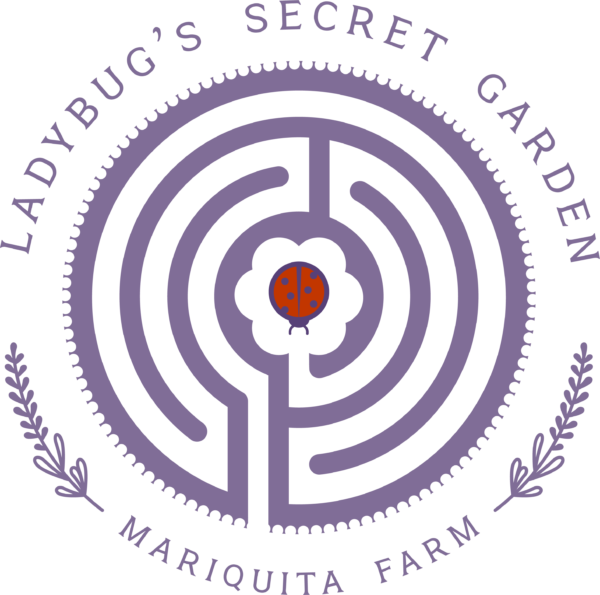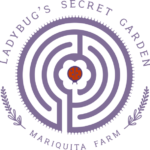Gifts
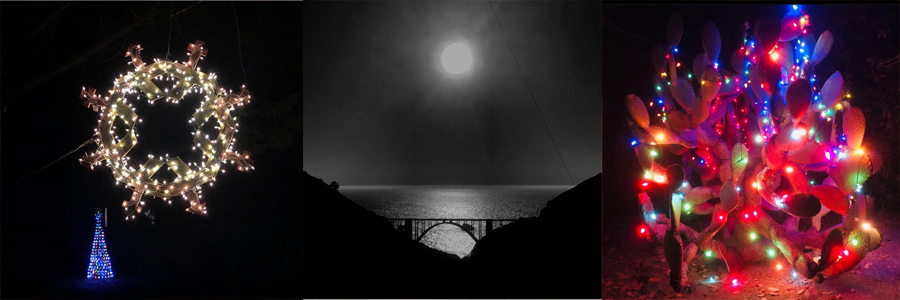
Not all gifts arrive wearing a bow. One of the best gifts my father ever got me was a big pile of dirt. I was five years old and a pickup sized load of topsoil was deposited in our backyard. My father explained that it was all mine and that I could run my trucks and tractors there without pesky regulations getting in the way. What he meant, of course, was that I could no longer run my bulldozers through his petunias. I loved the dirty gift then, and I love the fact that every time I get really dirty I still remember my dad and that moment in 1964.
As “down to earth” as that gift was, another of the best gifts I’ve ever received was also from my father, but of a more cerebral nature. Both my mom and my dad were educated in little red, one-roomed rural schoolhouses and it amazes me to think how much things have changed, they were both taught Latin. I say “taught,” not “learned” because I’m not sure that the lessons were learned by both parents. My mom told me that one of the examples of recess time doggerel that she could remember was the saying, “Latin is a dead language. It died across the sea. It killed the Greeks and Romans, and now it’s killing me.”
But my father remembered his Latin. And because he became a botanist, and because the International language of botanic taxonomy is Scientific Latin, my father had frequent occasions to understand and use Latin as a living language. Dad taught me how language could be understood as more than a convention of arbitrary marks and sounds with stupid arbitrary rules of grammar. He explained what scientific words meant and how you could decode names and turn words into games if you took the time to understand the “roots” of the word. The scientific name for the mint family, for example, is Labiatea, from the Latin “labia” meaning “lips.” The name was given to this plant family because their flowers typically have petals that are fused to form a tube with an upper and lower lip, or labia, at the opening
Getting turned on to the fun of treating language as a code makes everything more interesting. We live in between the communities of Corralitos and Salsipuedes, for example. Spanish is simply an evolved form of Latin that’s been mixed with Arabic and various indigenous pre-Columbian languages so reading our local road signs and looking to the roots of place names makes for a fun exercise in learning history. “Corralitos ” means “little corrals,” and points back to the redwood fairy rings that once served the Spanish conquistadors as little corrals for their donkeys and horses. “Salsipuedes” means, “get out if you can” in the colloquial Spanish of the Mexican cowboys who chased their longhorns through the woods here before the Goldrush, and refers to the steepness of the canyon and the impenetrable brush of the neighborhood.
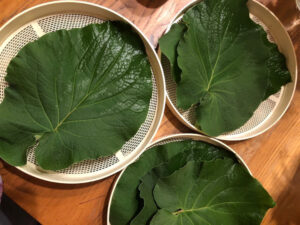 Having fun with language helped me to learn Spanish, which in turn has made my time working with Mexican farmworkers so much more interesting and valuable than it otherwise would have been. I’m thinking now of Fidel, who is the foreman in our greenhouse, and who shares my interest in plants. Starting several years ago he began lobbying me to grow “Hoja Santa.” “Everybody uses the leaf,” he told me, “fresh when they can get it that way, dried when they can’t.” By “everybody” he means “everybody he grew up with in Oaxaca.”
Having fun with language helped me to learn Spanish, which in turn has made my time working with Mexican farmworkers so much more interesting and valuable than it otherwise would have been. I’m thinking now of Fidel, who is the foreman in our greenhouse, and who shares my interest in plants. Starting several years ago he began lobbying me to grow “Hoja Santa.” “Everybody uses the leaf,” he told me, “fresh when they can get it that way, dried when they can’t.” By “everybody” he means “everybody he grew up with in Oaxaca.”
“Hoja Santa” means “Holy Leaf.” But Hoja Santa isn’t a botanic term- it’s a colloquialism, and I often hear the crew call the plant “Yerba Buena,” which means “Good Herb.” So before we planted any of Fidel’s Hoja Santa I hit the books to read up on the plant. Most plants that are called “holy” or “good” are very scented with healing properties, and an astonishing number of them are mint family relatives- the Labiatea with the flowers with lips all pooched out to smooch. Basil is a mint family member. So are the sages, rosemary, mints, shisos, thymes, catnips, oreganos, marjorams, nepitella, horehound, chia- the list goes on and on. I guess my father also gifted me with his love for plants.
But Fidel’s Hoja Santa turned out to be Piper auritum; a pepper plant, related to the Black pepper that we use on our eggs and in our soups and stews. Hoja Santa has a strong, sweet aroma of anis. The plant is no relation to true anis, which is in the Umbelliferea, the “umbel” referring to the umbrella-like shape common to the flower heads of the carrot family. Hoja Santa is also used, as an herb in egg dishes and in soups and stews but it is sweet, not spicy like it’s peppercorn cousin. We’re pruning the plants back now because they’re crowding the aisle in the greenhouse, but also because Fidel tells me “everybody needs Hoja Santa now to make pozole.” Well, maybe “everybody” isn’t making pozole, but Hoja Santa is a good herb for many other soups and stews. It’s also used to wrap cheeses in because it imparts some of its scent to the cheese and is delightful in egg dishes.
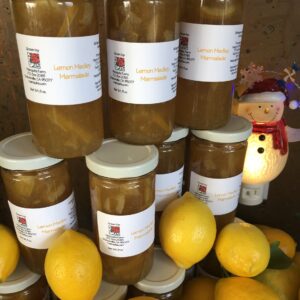 When I think about the scientific names of plants my father comes alive for me again, and that’s a gift. I wonder what gift I gave him that meant a lot? One gift I gave my father still means a lot to me. He wasn’t an easy person to give things to because he didn’t really want much and didn’t seem to need much (except for peace and quiet). He had simple tastes and was always satisfied with a peanut butter and jelly sandwich. Expensive bottles of wine would have been wasted on him – he drank water. But I observed that he enjoyed marmalade, so every Christmas I’d go to the Mediterranean Market in Carmel and get him little ceramic pots of orange, lemon, and lime marmalade imported from Scotland. Now we’re picking our own lemons and Happy Girl Kitchen in Pacific Grove, CA. is making marmalade for us that is available for purchase on its own or in our citrus gift bags. Our lime and orange trees are growing right behind the lemons and will be ready to harvest in a couple of years. He’d like the marmalade and I like to think that he’d like to see what we’ve done to the family ranch. My father gifted me a quarter interest in this property and I was able to gradually buy the rest of the family out. With this land, just like his love for language, for plants, and for soil, my father gave a big gift that keep on giving.
When I think about the scientific names of plants my father comes alive for me again, and that’s a gift. I wonder what gift I gave him that meant a lot? One gift I gave my father still means a lot to me. He wasn’t an easy person to give things to because he didn’t really want much and didn’t seem to need much (except for peace and quiet). He had simple tastes and was always satisfied with a peanut butter and jelly sandwich. Expensive bottles of wine would have been wasted on him – he drank water. But I observed that he enjoyed marmalade, so every Christmas I’d go to the Mediterranean Market in Carmel and get him little ceramic pots of orange, lemon, and lime marmalade imported from Scotland. Now we’re picking our own lemons and Happy Girl Kitchen in Pacific Grove, CA. is making marmalade for us that is available for purchase on its own or in our citrus gift bags. Our lime and orange trees are growing right behind the lemons and will be ready to harvest in a couple of years. He’d like the marmalade and I like to think that he’d like to see what we’ve done to the family ranch. My father gifted me a quarter interest in this property and I was able to gradually buy the rest of the family out. With this land, just like his love for language, for plants, and for soil, my father gave a big gift that keep on giving.
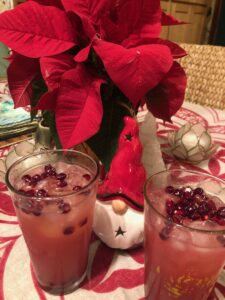 Happy Holidays to all of you, from all of us at Mariquita Farm!
Happy Holidays to all of you, from all of us at Mariquita Farm!
© 2020 Essay and Photos by Andy Griffin.
